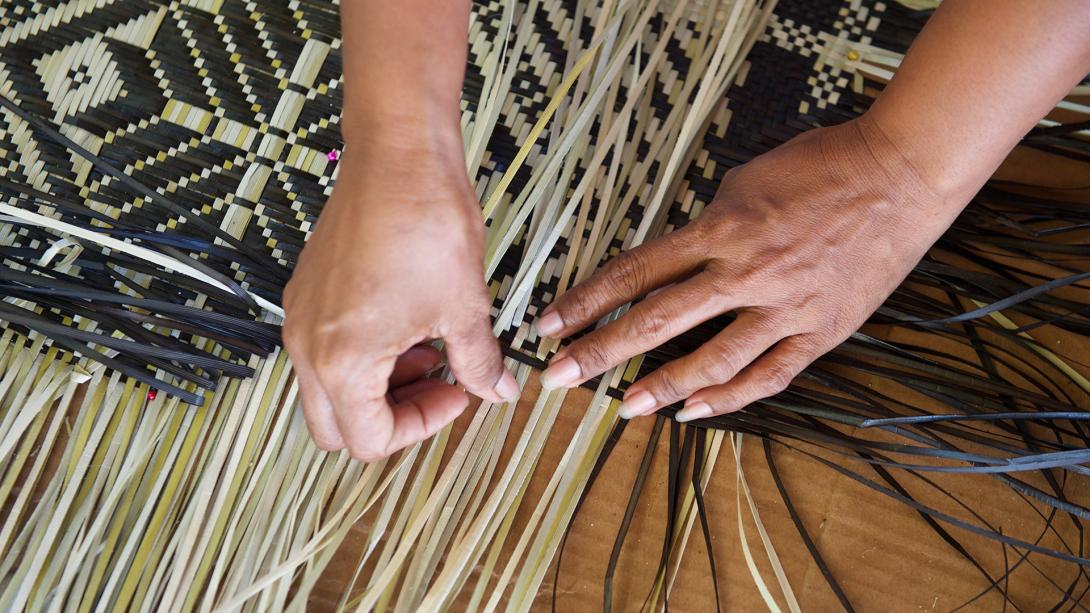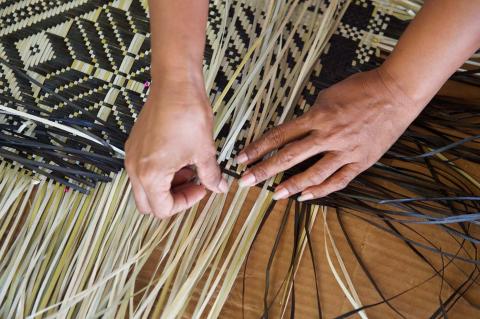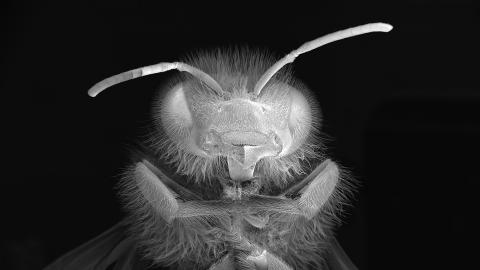Jaki-ed Project
APT9
Artists: Artina Clarence, Rosie Elmorey, Helmera Fandino, Kathy Jetñil-Kijiner, Banithe Jesse, Roselee Jibon, Susan Jieta, Susanta Jieta, Mela Kattil, Airine Keju, Moje Kelen, Clantine Moladrik, Motdrik Paul, Terse Timothy
Featuring art from Micronesia for the first time in the history of the Asia Pacific Triennial, the Marshall Islands Jaki-ed weaving project represents the outcome of a collaborative 21-day workshop involving 13 expert weavers in conjunction with performance artist and weaver Kathy Jetñil-Kijiner. The Marshall Islands artists are known for their finely woven dress mats, made from pandanus and bordered with intricate geometric designs. Jaki-ed is a weaving technique historically employed to make the mats. Commonly worn prior to colonisation, dress mats express value and status and tell stories of ancestors, nation and community. A new apprenticeship program has contributed to a recent revival of the jaki-ed art form, and the collaborative workshop enabled the exchange of dialogue and ideas, encouraging artists to innovate and experiment with their work. In turn, Jetñil-Kijiner will create a dynamic performance work detailing her own engagement with weaving as a site of cultural resistance and expression.
Jaki-ed Project was developed in collaboration with the University of South Pacific, Majury and supported by QAGOMA's Oceania Women's Fund, enabled by the generous bequest of Jennifer Phipps.

Jaki-ed weaving workshop, Majuro, Republic of the Marshall Islands, September 2017 / © The artists / Photograph: Christine Germano
Made from pandanus fibres, jaki-ed or nieded mats are unique to the Marshall Islands and are among the finest examples of weaving in Oceania. The weaving technique almost disappeared when trade cloth was introduced to the Marshall Islands, but disruptions in shipments during World War Two prompted its revival. In 2011, a new apprenticeship program supported weavers to learn the art form within the traditional weaving circle, a place where women could exchange knowledge and cultural values. To create the exquisite jaki-ed mats on display in APT9, expert weavers from six different atolls participated in a three-week weaving circle workshop in Majuro in September 2017, facilitated by QAGOMA and the University of the South Pacific.
In the matrilineal society of the Marshall Islands, women are believed to possess unique creative attributes, and from a young age, girls are encouraged to innovate using skills learnt from their elders. Jaki-ed mats are always woven from the centre outwards. The plain centre is a symbol of the purity of heart and soul that must be at the core of any personal endeavour. Intricate geometric borders are expressions of the weaver’s ancestry. A mat’s design can reveal an artist’s identity or their island of origin. Each band of the border has no perceptible beginning or end, symbolising the endless and unbreakable bond that an individual has with their community and ancestors.

(Jaki-ed) 2017
- PAUL, Motdrik - Artist
- TIMOTHY, Terse - Artist

(Jaki-ed) 2017
- MOLADRIK, Clantine - Artist
- CLARENCE, Artina - Artist

(Jaki-ed) 2017
- KELEN, Moje - Artist
- JIBON, Roselee - Artist

(Jaki-ed) 2017
- KATTIL, Mela - Creator

(Jaki-ed) 2017
- JIETA, Susan - Creator

(Jaki-ed) 2017
- JESSE, Banithe - Artist
- JIETA, Susanta - Artist

(Jaki-ed) 2017
- FANDINO, Helmera - Artist
- KEJU, Airine - Artist

(Jaki-ed) 2017
- ELMOREY, Rosie - Creator


